July 21 to July 27
If the “Taiwan Independence Association” (TIA) incident had happened four years earlier, it probably wouldn’t have caused much of an uproar.
But the arrest of four young suspected independence activists in the early hours of May 9, 1991, sparked outrage, with many denouncing it as a return to the White Terror — a time when anyone could be detained for suspected seditious activity.

Photo: Huang Yi-shu, Taipei Times
Not only had martial law been lifted in 1987, just days earlier on May 1, the government had abolished the Temporary Provisions Effective During the Period of National Mobilization for Suppression of the Communist Rebellion (動員戡亂時期臨時條款), which provided the Chinese Nationalist Party (KMT) legal basis for 43 years of authoritarian rule.
Those detained were history researcher Chen Cheng-jan (陳正然), indigenous missionary Masao Nikar, grassroots activist Wang Hsiu-hui (王秀惠) and National Tsing Hua University (NTHU) history student Liao Wei-cheng (廖偉程). All four were active in various social and political causes. Two days later, a fifth suspect Cegau Drululan was also arrested.
Charged under the Punishment of Rebellion Act (懲治叛亂條例), the five faced possible death sentences.
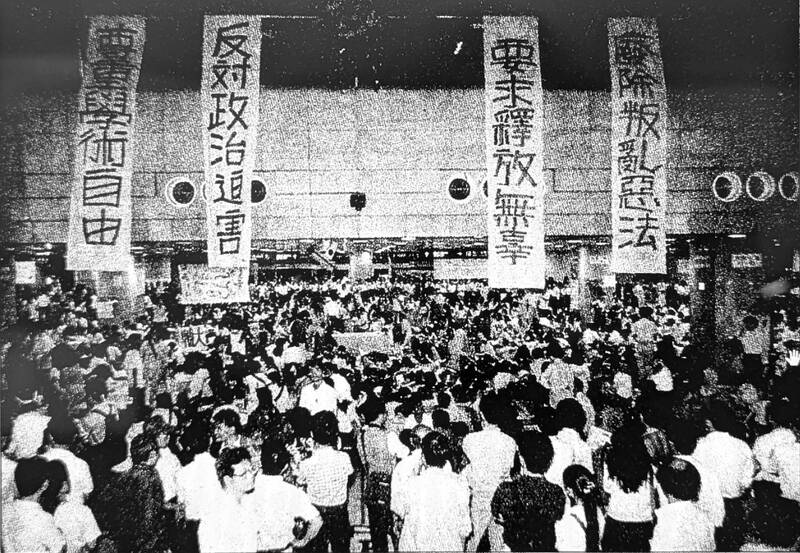
Photo: Huang Yi-shu, Taipei Times
Since Liao was arrested in his dorm without prior notice to the school, campus administrators were furious. That same evening, more than 40 students and faculty staged a protest in front of the Investigation Bureau.
The incident ballooned from there as protests grew, several involving clashes with the police. Although the Legislative Yuan abolished the Punishment of Rebellion Act on May 17, the suspects were still sentenced under Article 100 of the Criminal Code.
Through the relentless advocacy of the “100 Action League” (100行動聯盟), the law was amended in May 1992 to exclude nonviolent actions calling for peaceful reform. On July 27, the case was dismissed.
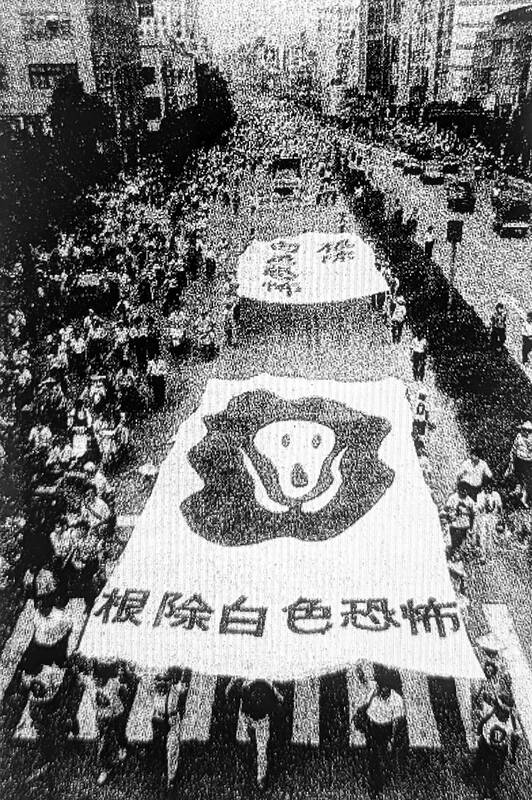
Photo: File
CONNECTION TO SU BENG
Although social and political movements became common after the end of martial law, many authoritarian institutions and laws remained intact. In March 1990, the Wild Lily student movement erupted as students occupied Chiang Kai-shek Memorial Hall for seven days, demanding that the KMT dissolve the so-called “ten-thousand year congress,” repeal the Temporary Provisions and set a timetable for political reform.
On May 1, 1991, the government scrapped the Temporary Provisions, returning the nation to full constitutional rule (see “Taiwan in Time: The ‘communist rebellion’ finally ends,” April 25, 2021).
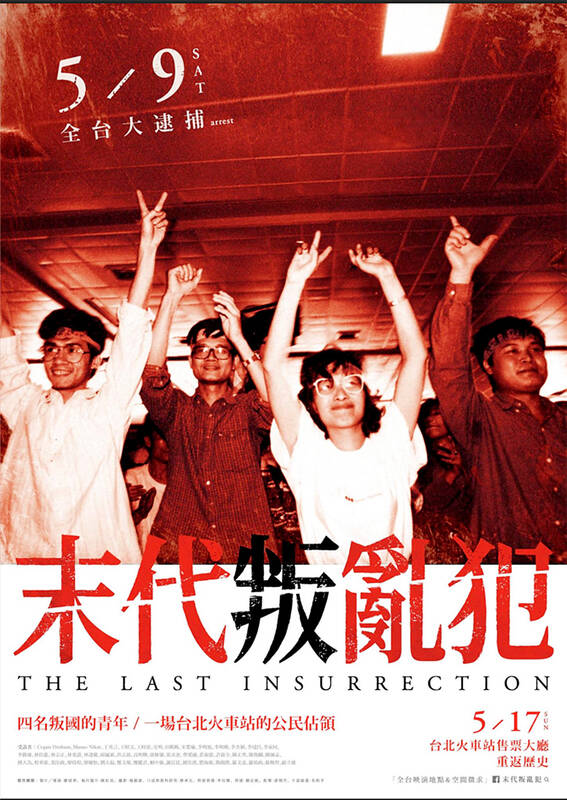
Photo courtesy of The Last Insurrection
But any mood for celebration was dashed just nine days later with the TIA arrests. They were the first political arrests since the end of martial law.
The five were accused of joining independence figure Su Beng’s (史明) Taiwan Independence Association, which he ran while in exile in Japan. Authorities claimed that they were helping Su establish a branch in Taiwan and spreading separatist propaganda. They also allegedly read Su’s banned book, Taiwan’s 400-Year History (台灣人四百年史).
According to The Last Insurrection (末代叛亂犯) by Liao Chien-hua (廖建華) and Huang Chia-yu (黃佳玉), the four arrested on May 9 were active in various social and political causes. They were all inspired by Su’s book and had all visited him in Japan.
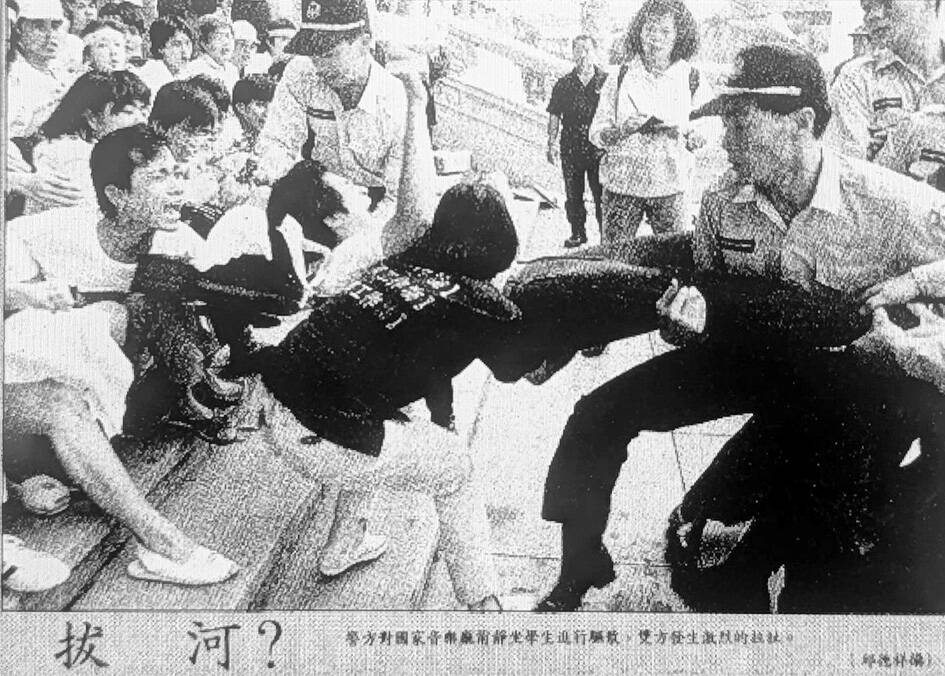
Photo: Chiu Te-hsiang, Taipei Times
Wang and Masao received stickers and other promotional material to distribute, while Liao and Chen were putting together a Taiwanese history database based on Su’s research. Liao insisted that his visit was purely for academic purposes.
SPRINGING TO ACTION
Taiwan’s battle-tested university students, still riding the momentum of the Wild Lily movement, mobilized quickly, organizing various protests and going on strike. On the day of the arrest, NTHU students first petitioned Democratic Progressive Party (DPP) lawmakers, and later marched to the Investigation Bureau with banners that read “What crime did they commit?” and “White Terror.”
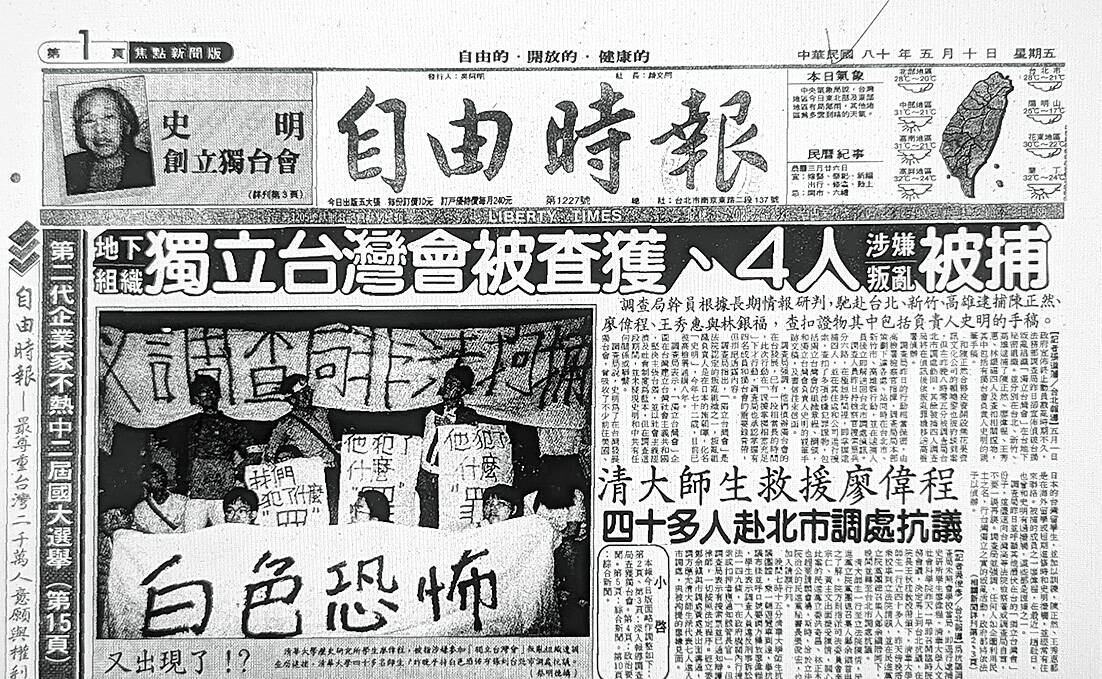
Photo: File
The Taiwan High Prosecutors Office claimed that it was just enforcing the law. According to the Liberty Times, officials argued that abolishing the Temporary Provisions only changed how the government deals with Beijing, and had nothing to do with its stance toward domestic seditious behavior. Premier Hau Pei-tsun (郝柏村) apologized for failing to notify the school before the arrest, but insisted that their actions were “completely legal.”
On May 12 and May 13, National Taiwan University (NTU) students and professors held a sit-in at Chiang Kai-shek Memorial Hall, only to be forcefully removed by the police. This caused further public anger.
On May 15, thousands of students posed as passengers and occupied Taipei Railway Station’s main hall. They demanded the repeal of the Punishment of Rebellion Act, an end to political persecution, release of the detainees and protection of academic freedom. They were supported by scholars, lawyers, activists and opposition politicians.
Under mounting pressure, the Legislative Yuan abolished the act on May 17. They also released the detainees on bail, who immediately headed to the station to thank the protesters.
However, the fight wasn’t over. On May 20, about 20,000 demonstrators filled the streets, railing against campus interference by the military, police and intelligence personnel, and the government’s use of authoritarian-era laws to persecute political activists. They also urged Hau to resign.
AGAINST ARTICLE 100
Nevertheless, the detainees were still prosecuted under Article 100 of the Criminal Code. On Sept. 8, a group of intellectuals led by NTU economics professor Chen Shih-meng (陳師孟) launched the 100 Action League (100行動聯盟), aimed at repealing the law. According to The 100 Action League and Freedom of Speech (100行動聯盟) by Chang Yen-hsien (張炎憲) and Chen Feng-hua (陳鳳華), Chen Shih-meng was beaten by the police during the May 13 sit-ins.
The league warned that if their demands were not met by Oct. 10, they would hold a march to disrupt that day’s Double Ten military parade. They met with officials throughout the month and reached an agreement with then-KMT secretary-general James Soong (宋楚瑜) on Oct. 5 to modify the law — but Hau rejected the proposal.
On Oct. 9, supporters began assembling in front of NTU’s College of Medicine near the legislature, but the police blocked access to the military parade ground with wired fences and stopped more people from joining. Around midnight on Oct. 10, the police began removing the protesters by force. They linked hands and refused to budge, but were eventually dragged and carried away, which detractors blasted as police interference on campus again. To avoid further escalation, the league held a silent protest in front of NTU instead.
Meanwhile, the TIA case proceeded. On Dec. 3, the court sentenced Chen Cheng-jan and Wang to two years, and Masao to 18 months. Cegau received a suspended sentence, while Liao was acquitted on grounds that his visit with Su was purely academic.
They all slammed Taiwan’s justice system in response. Chen said it reminded him of the medieval inquisitions in Europe: “We are willing to bear this original sin and become a milestone of the KMT’s demise,” he told the Liberty Times.
Masao said, “I cannot accept the ruling, and I won’t back down because of this. I hope Taiwanese understand that if we don’t want to be ruled by the KMT for another 40 years, we can’t afford to stay asleep.”
The 100 Action League continued to travel the country and push their case, and finally on May 15, the Legislative Yuan amended the law to exclude peaceful political advocacy and only punish those who engaged in forceful or threatening behavior. With this, it was no longer illegal to endorse Taiwanese independence or any other previously sensitive topics. Numerous activists were released, and 240 cases were dismissed — including the TIA case.
Taiwan in Time, a column about Taiwan’s history that is published every Sunday, spotlights important or interesting events around the nation that either have anniversaries this week or are tied to current events.

This month the government ordered a one-year block of Xiaohongshu (小紅書) or Rednote, a Chinese social media platform with more than 3 million users in Taiwan. The government pointed to widespread fraud activity on the platform, along with cybersecurity failures. Officials said that they had reached out to the company and asked it to change. However, they received no response. The pro-China parties, the Chinese Nationalist Party (KMT) and Taiwan People’s Party (TPP), immediately swung into action, denouncing the ban as an attack on free speech. This “free speech” claim was then echoed by the People’s Republic of China (PRC),

Exceptions to the rule are sometimes revealing. For a brief few years, there was an emerging ideological split between the Democratic Progressive Party (DPP) and Chinese Nationalist Party (KMT) that appeared to be pushing the DPP in a direction that would be considered more liberal, and the KMT more conservative. In the previous column, “The KMT-DPP’s bureaucrat-led developmental state” (Dec. 11, page 12), we examined how Taiwan’s democratic system developed, and how both the two main parties largely accepted a similar consensus on how Taiwan should be run domestically and did not split along the left-right lines more familiar in

Many people in Taiwan first learned about universal basic income (UBI) — the idea that the government should provide regular, no-strings-attached payments to each citizen — in 2019. While seeking the Democratic nomination for the 2020 US presidential election, Andrew Yang, a politician of Taiwanese descent, said that, if elected, he’d institute a UBI of US$1,000 per month to “get the economic boot off of people’s throats, allowing them to lift their heads up, breathe, and get excited for the future.” His campaign petered out, but the concept of UBI hasn’t gone away. Throughout the industrialized world, there are fears that

Most heroes are remembered for the battles they fought. Taiwan’s Black Bat Squadron is remembered for flying into Chinese airspace 838 times between 1953 and 1967, and for the 148 men whose sacrifice bought the intelligence that kept Taiwan secure. Two-thirds of the squadron died carrying out missions most people wouldn’t learn about for another 40 years. The squadron lost 15 aircraft and 148 crew members over those 14 years, making it the deadliest unit in Taiwan’s military history by casualty rate. They flew at night, often at low altitudes, straight into some of the most heavily defended airspace in Asia.